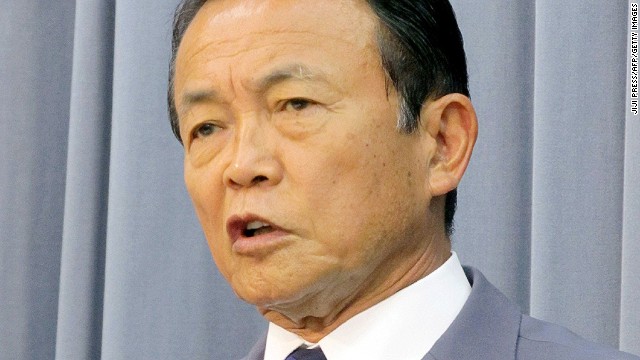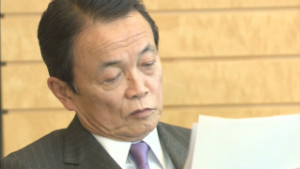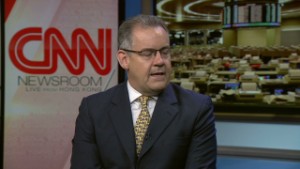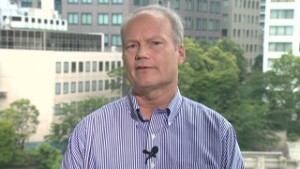Taro Aso - Wikipedia
https://en.wikipedia.org/wiki/Tarō_Asō
麻生 太郎. Taro Aso in World Economic Forum Annual Meeting in Davos (
August 2, 2013 -- Updated 1206 GMT (2006 HKT)

(CNN) -- Japan's deputy prime minister stirred controversy this week by appearing to suggest that the government could learn from the way that Nazi Germany changed its constitution.
The remarks by Taro Aso,
who is also the Japanese finance minister, provoked criticism from
Japan's neighbors and a Jewish organization in the United States.
Aso, a former prime
minister who has slipped up with verbal gaffes in the past, retracted
the comments later in the week but refused to apologize for them or
resign, saying they had been taken out of context.
Amid persistent talk in
Japan about revising the country's pacifist post-war constitution, Aso
set off the controversy at a seminar Monday, in which he said that
discussions over constitutional changes should be carried out calmly.
"Germany's Weimar
Constitution was changed into the Nazi Constitution before anyone knew,"
he said in comments widely reported by the Japanese media. "It was
changed before anyone else noticed. Why don't we learn from that
method?"
Aso added: "I have no
intention of denying democracy. Again, I repeat that we should not
decide [constitutional revisions] in a frenzy."
In 1933, Adolf Hitler's
National Socialists turned the democratic Weimar Republic into a
dictatorship using "a combination of legal procedure, persuasion, and
terror," according to the U.S. Library of Congress.
 January: Deputy PM's 'die quickly' blunder
January: Deputy PM's 'die quickly' blunder
 Japan PM victory can bring new reforms
Japan PM victory can bring new reforms
 Will Abenomics succeed?
Will Abenomics succeed?
Hitler used a fire that
burned down the parliament building as a pretext to suppress the
opposition through an emergency clause in the constitution. He then
pushed through the Enabling Act, which allowed him to govern without
parliament and vastly extend the Nazis' grip on power.
Words that hurt
Aso's apparent reference
to those changes drew expressions of concern from the governments of
China and South Korea, two countries that suffered heavily under
Japanese imperial aggression during World War II, a conflict in which
Japan was allied with Nazi Germany.
Beijing and Seoul are
already wary of Japan's hawkish prime minister, Shinzo Abe. His campaign
platform for elections last year included measures aimed at restoring
Japanese national pride such as revising the constitution to give the
country's self-defense forces the status of a regular army.
Abe's party now has
control of both houses of parliament. But it remains unclear if he will
take on the difficult, controversial challenge of constitutional change,
which would require a two-thirds majority in both chambers.
Hong Lei, a spokesman
for the Chinese foreign ministry, said Wednesday that Aso's comments
mean that other countries need to step up their vigilance over the
direction in which Japan is headed.
China and Japan are
locked in a tense territorial dispute over a set of small, uninhabited
islands in the East China Sea that has fueled nationalist sentiments in
on both sides.
South Korea, meanwhile, called for "prudence" from Japanese political leaders.
"Such comments definitely hurt a lot of people," Cho Tai-young, a foreign ministry spokesman, said Tuesday.
And the Simon Wiesenthal
Center, a Jewish human rights organization based in Los Angeles,
demanded that Aso immediately clarify his remarks.
"What 'techniques' from
the Nazis' governance are worth learning — how to stealthily cripple
democracy?" asked Rabbi Abraham Cooper, an associate dean at the center.
"The only lessons on
governance that the world should draw from the Nazi Third Reich is how
those in positions of power should not behave," Cooper said in a statement Tuesday.
'Great misunderstandings'
Aso responded Thursday
to the criticism over his comments, which also came from opposition
lawmakers in Japan, saying he regretted that the remarks had "caused
great misunderstandings despite my true intentions."
He said that he had
referred to the Nazi takeover of power as a "bad example" of
constitutional revision because changes were forced through "in a
commotion." They should be done through calm debates instead.
"I believe it is obvious
that I feel extremely negatively about Nazi Germany, if you consider
the entire context," he said. "However, since these remarks have caused
serious misunderstandings, I would like to retract them."
Japanese Cabinet
Secretary Yoshihide Suga told a news conference the same day that "the
Abe administration definitely does not view Nazi Germany positively and I
am sure Vice Prime Minister Aso himself does not either."
It's not the first time
Aso's words have gotten him into hot water. At a meeting about social
security reform and healthcare costs in January, he caused offense by suggesting it would be best for people on life support to "die quickly."
"Aso's comment about
Hitler and the implication that his example should be followed are
utterly unacceptable," the Asahi Shimbun, a daily newspaper, said in an editorial Friday. " The remark is not something that Aso can get away with by simply retracting it."
******
Theodore Solotaroff, Founder of The New American Review, Is Dead at 80
Theodore Solotaroff, who in 1967 started The New American Review as a highly unusual showcase for a rising generation of writers, including Philip Roth, William H. Gass and Mordecai Richler in just the first issue, died on Friday at his home in East Quogue, N.Y. He was 80.
The cause was complications of pneumonia, said his son Jason.
The New American Review, which dropped the “New” along the way, operated as a kind of open house for fiction writers and practitioners of the new journalism. A literary journal produced as a paperback book (with a paperback price), its first issue offered readers the work of 29 writers, not only fiction but also nonfiction by Conor Cruise O’Brien, Stanley Kauffmann and Theodore Roszak.
For the next decade, with many a financial hiccup, The New American Review, whose back-cover blurb proclaimed it “a writer’s magazine for the new literary audience,” presented Americans and scattered foreigners (including the then-unknown Ian McEwan), as well as cultural journalism. Nearly all of it was filtered through the fine-tuned sensibilities of Mr. Solotaroff.
Its politics, if it had any, were vaguely liberal, its aspirations lofty but nonspecific.
In an editor’s note, Mr. Solotaroff announced that his publication would studiously avoid “the tendency toward cult and coterie by which literary magazines usually define their particular territory and assert their standards.” It would not be, in other words, Partisan Review or Commentary. Instead, with mass-market print runs of more than 100,000, it would appeal to an untapped audience ready to savor the finest in current fiction and journalism executed with literary flair. Mr. Solotaroff believed, incorrectly, that this formula could be a paying proposition.
Issued three times a year, The New American Review was less a magazine with recognizable departments and columnists than a rolling literary anthology that accommodated fiction writers as diverse as Donald Barthelme, Michael Herr, E. L. Doctorow, Harold Brodkey and Robert Coover. In its pages, readers encountered Kate Millett on sexual politics, Norman Mailer on Henry Miller, A. Alvarez on Sylvia Plath and Michael Rossman on the spiritual satisfactions of building your own geodesic dome.
Mr. McEwan, in a blurb he wrote for Mr. Solotaroff’s essay collection “The Literary Community,” said that “as the most influential editor of his time, he shaped not only the tastes, but the direction of American writing.”
Theodore Solotaroff, known as Ted, was born and raised in Elizabeth, N.J., where his father owned a plate-glass company that yielded scant income during the Depression. A tyrant of mythic proportions, Ben Solotaroff brutalized his sensitive, artistic wife, Rose, and beat Ted, often threatening “to break your spirit once and for all,” Mr. Solotaroff recalled in his first memoir, “Truth Comes in Blows.”
Both parents left their mark. “He was an odd combination of ferocity and tenderness,” said his son Paul, a senior writer for Rolling Stone and Men’s Journal. “His sons saw the former and his writers the latter.”
After serving in the Navy after high school, Mr. Solotaroff, a rabid sports fan, entered the University of Michigan, whose football games he had often listened to on the radio. He played basketball as a freshman and earned a degree in English.
He also married a fellow student, Lynn Ringler. The marriage ended in divorced, and she died in 1994. His marriages to Shirley Fingerhood and Ghislaine Boulanger, both of Manhattan, ended in divorce.
In addition to his sons Paul, of Brooklyn, and Ivan, of New Town, Pa., both from his first marriage, he is survived by his sons Jason, of Montclair, N.J., from his marriage to Ms. Fingerhood, and Isaac, of Brooklyn, from his marriage to Ms. Boulanger; his wife, Virginia Solotaroff of East Quogue; a brother, Robert, of Minneapolis; and six grandchildren.
After college, Mr. Solotaroff headed to New York to make his way as a writer. Instead he waited tables. Discouraged, he entered the University of Chicago and had nearly completed a dissertation on Henry James when fate derailed his planned academic career.
Mr. Roth, a fellow student, recommended him to the editor of The Times Literary Supplement, who wanted an essay on American Jewish writers. Mr. Solotaroff’s contribution caught the eye of Norman Podhoretz, the editor of Commentary, who hired him as an editor at the magazine in 1960.
After several years at Commentary (which was steering politically rightward under Mr. Podhoretz and whose internal dramas provided the backdrop for a further volume of memoirs Mr. Solotaroff was writing at the time of his death), he became editor of Book Week, the Sunday book supplement of The New York Herald Tribune.
When The Herald Tribune closed, in 1966, Mr. Solotaroff found work at the New American Library, a publisher of quality paperbacks. There he proposed a thick literary magazine along the lines of The Anchor Review, once published by Doubleday, and New World Writing, published by the New American Library in the 1950s. Stanley Moss was hired as its poetry editor, succeeded by Richard Howard.
Although a critical success, the magazine struggled financially. In 1970 New American Library withdrew its support. Simon & Schuster and later Bantam stepped into the breach, but in 1977, with Issue No. 26, the magazine breathed its last, after publishing the work of 500 different writers, 200 short stories, 300 poems and 130 essays.
Mr. Solotaroff went to work as an editor at Harper & Row, now HarperCollins, where he edited Russell Banks, Sue Miller, Max Apple and Bobbie Ann Mason. Ms. Mason, in a telephone interview, called him “one of the last of the great editors,” someone who “cared about every line.”
After retiring, he worked on his memoirs. A second installment, “First Loves,” appeared in 2003. His essays have been collected in several volumes, including “The Red Hot Vacuum” and “A Few Good Voices in My Head.”
“He had very high expectations of himself,” said his son Jason. “Unfortunately these extended to the golf course. He could never believe that he hit the ball as badly as he did.”

沒有留言:
張貼留言